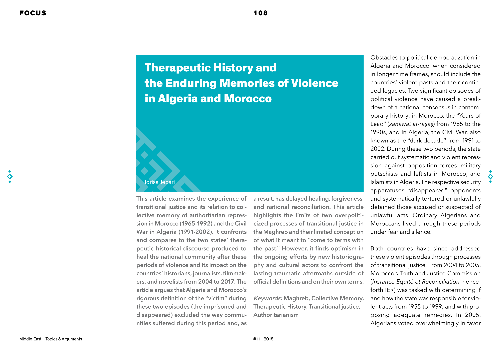Therapeutic History and the Enduring Memories of Violence in Algeria and Morocco
This article examines the experience of transitional justice and its relation to collective memory of authoritarian repression in Morocco (1965-1992) and the Civil War in Algeria (1991-2002). It confronts and compares to the two states’ therapeutic historical discourse produced to heal the national...
保存先:
| 出版年: | Middle East - Topics & Arguments |
|---|---|
| 第一著者: | |
| フォーマット: | Artikel (Zeitschrift) |
| 言語: | 英語 |
| 出版事項: |
Philipps-Universität Marburg
2018
|
| 主題: | |
| オンライン・アクセス: | オンライン・アクセス |
| タグ: |
タグ追加
タグなし, このレコードへの初めてのタグを付けませんか!
|
| 要約: | This article examines the experience of transitional justice and its relation to collective memory of authoritarian repression in Morocco (1965-1992) and the Civil War in Algeria (1991-2002). It confronts and compares to the two states’ therapeutic historical discourse produced to heal the national community after these periods of violence and its impact on the countries’ historians, journalists, filmmakers, and novelists from 2004 to 2017. The article argues that Algeria and Morocco’s rigorous definition of the “victim” during these two episodes (the imprisoned and disappeared) excluded the way communities suffered during this period and, as a result, has delayed healing, forgiveness, and national reconciliation. This article highlights the limits of two overpoliticized processes of transitional justice in the Maghreb and their limited conception of what it meant to “come to terms with the past.” However, it finds optimism in the ongoing efforts by new historiography and cultural actors to confront the lasting traumatic aftermaths outside of official definitions and on their own terms. |
|---|---|
| DOI: | 10.17192/meta.2018.11.7808 |
 Publikationsserver
Publikationsserver